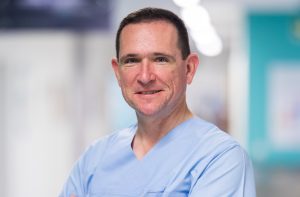Pascal Stammet recently joined the University of Luxembourg as Affiliated Professor of Medicine and as of September 2024, he will be the Study Programme Director of the Bachelor in Medicine.
Could you introduce yourself?
“I’m a medical doctor specialised in anesthesia and intensive care medicine with a special focus on intensive care medicine. I did my PhD at Liège University, Belgium, on the outcome prediction after cardiac arrest. Since 2004, I work at the Centre Hospitalier de Luxembourg (CHL) as a senior doctor in the intensive care unit (ICU) and the physician staffed prehospital emergency medical team (“SAMU”). For nearly four years I served as medical and health director of the National Fire and Rescue Corps (“Corps Grand-ducal d’incendie et de secours”, CGDIS) before returning to the clinics. My main clinical and research focus lies on the improvement of the treatment as well as on the prognostication of neurological outcome after cardiac arrest. Since many years, I’m strongly involved in a research network investigating the optimal hospital treatment strategies after cardiac arrest. This enabled me to participate in the largest randomised clinical trials on cardiac arrest, with significant impact on patient treatment reflected by changes in international guidelines. Together with the Luxembourg Institute of Health (LIH), we also did pioneer work on non-coding RNAs as biosignatures in cardiac arrest.”
Why did you join the University of Luxembourg?
“Since 2021, I have been involved as invited professor for the teaching activities related to emergency/critical care medicine in the Bachelor of Medicine. As a young university, with an even younger medical training programme, I see a huge area of development in the field of medical education. As a Luxembourger, I consider it an honour and a responsibility to contribute to the expansion and progression of the medical education of our country.”
What will be your main activities and challenges?
“As of September 2024, I will be the director or studies of the Bachelor of Medicine at the University of Luxembourg. My main mission will be to strengthen and develop this still very young bachelor programme in medicine. Through external evaluation and internal structuring work, we will aim to strive for further quality improvement alongside the increase of programmes offered. Encouraging young students to engage into medical studies in Luxembourg is also a key part of this effort. Together with my colleagues from the Department of Life Sciences and Medicine (DLSM) and the Faculty of Science, Technology and Medicine (FSTM), we will set up a whole new integrative structure heading towards a new department encompassing medicine, nursing sciences, allied health professions and life sciences. Furthermore, I aim at bringing clinical research forward at the university and fostering the translational link between clinical research (bed side questions) to the laboratory research.”
